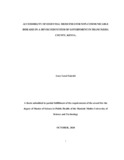| dc.description.abstract | Access to medicines is a multidimensional concept said to exist when patients have continuous availability of essential medicines at affordable prices and within a physical location that is accessible. With devolution of health services, access to essential medicines, including those for non-communicable diseaseis meant to improve. The study sought to determine the accessibility to essential medicines for the four major non communicablediseases in Trans-Nzoia County. The study was conducted in five hospitals within Trans Nzoia County using both qualitative and quantitative methods. Patients and key personnel within the health facilitieswere interviewed. Secondary documents fromthe health facility were also reviewed. The design was adescriptivecross sectional study carried out for three months among outpatients with non-communicable diseases.The sample size used was 320 participants attending the medical outpatient clinicand 25 key personnel. Thestudy participants were selected by use of simple random sampling. Data obtained was analyzed using mean, percentages, standard deviations as well as Chi and odds ratio. Thestudy found that most of thenon-communicablediseasesmedicines were unavailable at the health facilities at 23%. Medicines for management of diabetes werefound to be most available in all the hospitals at 80%.Stock out rate for essential medicines for non-communicable diseaseswas found to be high at 202 days per year, which was attributed to poor health care financing by the county government of Trans Nzoia.Medicines for cancer treatment were found to have the highest stock out daysat 334 days per year.Thestudy found the essential medicines for non-communicable diseases to be affordable based on the minimum daily wage calculationat 0.309days’wages. Affordability calculated was based on individual drugs and not for a complete therapy.However,78% of the participants reported that the medicines were not affordable. Medicines for management of chronic obstructive pulmonary disease were found to be most costly with affordability of0.449 days’wages.Additionally, the study showed that health facilities where participants received essential medicines for non-communicablediseaseswere geographically accessible with most participants at 92% using 1 hour or lessto get to the facility. However,with the use of daily wages the affordability of the transport means was found to be 0.52 days’wages hence not accessible.There was a significant association between the proportion of the prescribed drugs that the participantshad received and their health status, p=0.03.Withan epidemiological change in the low and medium income countries including Kenya from communicable diseases to non-communicablediseases, there is need for renewed focus on access to essential medicines for these conditions as reflected by the formation of division of non-communicablediseasein the Ministry of Health. Based on the study findings, there is need to increase healthcare funding by the county government for purchase of essential medicinesfor non-communicablediseases. This will greatly reduce stock out rates thereby increasing availability. | en_US |

